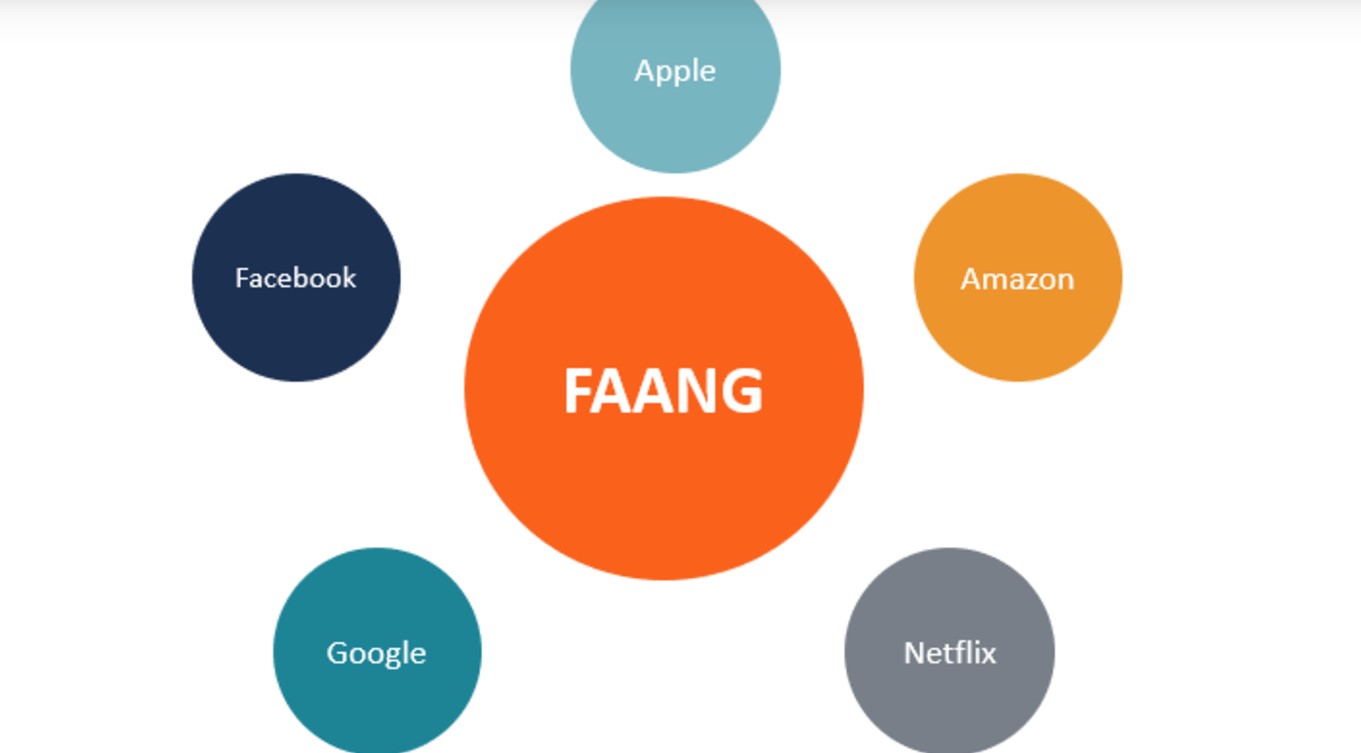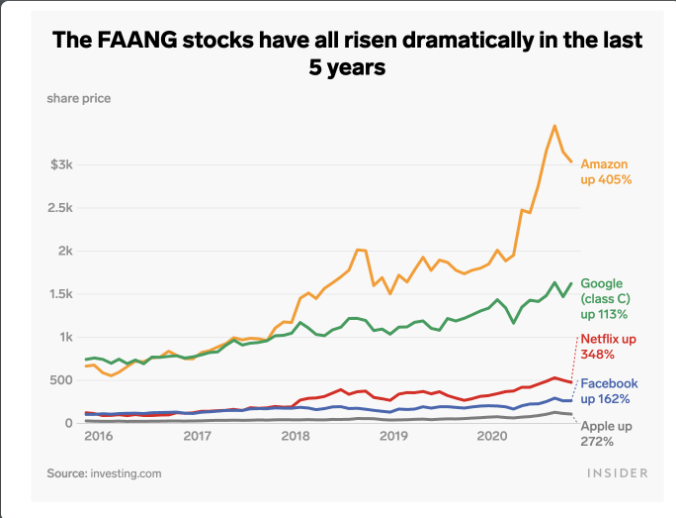What is FAANG Stocks: The 5 Big Tech Stocks Meaning
FAANG stocks are some of the most talked-about investments in the stock market, representing the five FAANG assets: Facebook, Amazon, Apple, Netflix, & Google. These high technology companies are known for their substantial growth and dominance in the tech industry, making them appealing to investors worldwide.
To truly grasp their significance, it's essential to ask what FAANG is. Knowing about FAANG stocks allows shareholders to explore opportunities to invest in FAANG and consider building their own little FAANG portfolio.

Table of content
Key Takeaways
Understanding FAANG Stocks
The Origins and Evolution of FAANG
The Five FAANG Stocks: A Closer Look
Understanding FAANG Stocks' Market Impact
What Makes FAANG Stocks So Popular?
How to Invest in FAANG Stocks
The Evolution of Big Tech: FAAMG and MAMAA
The Future of FAANG and Tech Investing
Conclusion
FAQs
Key Takeaways
The acronym FAANG, which stands for Facebook (Meta), Apple, Amazon, Netflix, and Google, denotes tech behemoths with substantial reserve power. Changes, such as Microsoft's dominance, are highlighted by evolving acronyms like FAAMG. FAANG stocks are accessible to shareholders through index funds, ETFs, or individual shares. Long-term success requires diversity and an understanding of new trends, even while boom potential is still high.
Understanding FAANG Stocks
FAANG stocks represent the five FAANG stocks: Facebook, Amazon, Apple, Netflix, and Google (now Alphabet), collectively forming a dominant force in the market. The term FAANG is an acronym, coined by Jim Cramer on CNBC's Mad Money in 2013, to highlight their impact on the tech industry and stock market.
These big tech stocks boast a combined market cap exceeding $4 trillion, reflecting their growth and influence. As part of the FAANG group, they dominate industries such as cloud computing, e-commerce, and advertising ventures, making them a central focus for shareholders and a technology focused fund worldwide.
The Origins and Evolution of FAANG
The term FAANG stocks was first introduced as FANG by Jim Cramer on CNBC's Mad Money in 2013, spotlighting four major tech companies: Facebook, Amazon, Netflix, and Google. Initially, the group excluded Apple, but the tech giant's addition in 2017 completed the FAANG stocks, reflecting its immense growth and influence in the tech sector.
FAANG is an abbreviation that symbolizes the big tech assets that dominate the market with their total market cap of trillions. While the FAANG group has faced challenges, such as rising interest rates, they continue to lead in e-commerce, cloud services, and innovation.
With Facebook rebranded as Meta Platforms and Google as Alphabet, FAANG remains synonymous with technological and financial dominance in the NASDAQ composite index.
The Five FAANG Stocks: A Closer Look
The five FAANG stocks—Facebook (Meta platforms), Amazon, Apple, Netflix, and Google (Alphabet)—represent a powerhouse of market dominance. FAANG is an acronym highlighting their leadership in cloud computing, e-commerce, and innovation sectors.
Each FAANG stock has consistently driven growth, with a combined market cap that underscores its financial prominence. Facebook leads in social media, Amazon dominates online retail, Apple thrives on its ecosystem, Netflix pioneers streaming, and Google excels in search and advertising.
These huge tech stocks are featured in top indexes like the NASDAQ composite index, attracting influential shareholders to top tech stocks and technology focused funds.
Understanding FAANG Stocks' Market Impact

The FAANG stocks—Facebook (Meta), Amazon, Apple, Netflix, and Google (Alphabet)—play a critical role in shaping the market. As some of the largest companies, their collective rise and influence are unparalleled, often driving the performance of major indexes like the S&P 500.
FAANG is an acronym synonymous with dominance in technology stocks, with a total market cap that reflects their economic importance. Investors are drawn to these big tech leaders for their innovation in areas like advertising business, cloud services, and streaming.
While some debate potential overvaluation, the FAANG continues to demonstrate resilience, buoyed by high investor confidence and inclusion in top returning ETF funds and an exchange traded fund like the Invesco QQQ Trust.
What Makes FAANG Stocks So Popular?
The FAANG stocks have become a favorite among investors due to their remarkable growth, strong brand recognition, and leadership in innovation. These five stocks, dominating industries like tech companies, streaming, and e-commerce, boast impressive marketplace capitalizations and historical returns.
FAANG stock performance is buoyed by inclusion in funds like tech sector ETF and NYSE technology ETF, drawing attention from influential investors and institutions like Soros Fund Management.
Although some question their valuations, the FAANG assets continue to stand as a symbol of dominance, shaping trends and attracting a huge portion of investments.
How to Invest in FAANG Stocks
Investing in FAANG stocks offers several strategies for both new and seasoned investors. One straightforward approach is purchasing individual stocks directly through brokerage platforms.
These stocks, known for their high stock price and dominance, represent a sizable part of the world's largest companies. Alternatively, investors can opt for tech funds or index funds like the Nasdaq-100, which prominently feature these stocks.
For those seeking diversified exposure, technology-focused funds or ETFs, such as Renaissance Technologies and other tech sector ETFs, include FANG stocks alongside other mamaa stocks. While high share prices can be a barrier, fractional shares or call options provide alternative methods, though options trading requires caution due to its complexities.
These five stocks' popularity, buoyed by high profile purchases and their role in shaping the past decade, reflects their influence in sectors like search engines, cloud services, and payment innovations such as Apple Pay.
Whether you’re pursuing direct stock ownership, ETFs, or options, it's essential to choose the right brokerage platform. For robust trading solutions, explore J2T’s MT5 Global platform for advanced tools and comprehensive support.
In summary, here is how to invest in FAANG stocks:
-
Buy individual stocks via a brokerage account.
- Invest in ETFs or index funds like Nasdaq-100.
- Consider tech-focused funds for diversification.
- Explore all options cautiously.
The Evolution of Big Tech: FAAMG and MAMAA
The tech landscape has evolved, shifting from the well-known added FAANG stocks to new acronyms like FAAMG and MAMAA. These updates reflect changes in the dominance of certain companies.
FAAMG adds Microsoft and removes Netflix, acknowledging Microsoft's growing influence with products like the Windows operating system and its investments in cloud-based computing, including Google Cloud competitors.
Meanwhile, MAMAA stocks, introduced by television host Jim Cramer, further replaces Facebook with Meta following its rebrand. The rationale lies in Netflix’s comparatively smaller trillion-dollar market cap and lesser substantial effect on broader markets.
These new terms herald trends in tech investing, with companies investing heavily in innovation to maintain dominance amid intense competition. Microsoft shares, along with other FAAMG stocks, represent a sizable portion of marketplace indices, showing their totally dominant position in the industry.
Is Microsoft a FAANG Stock?
Microsoft is not part of the original FAANG stocks. The FAANG definition was created to categorize newer, high-growth tech companies like Facebook, Amazon, and Netflix that emerged during the 2010s.
By contrast, Microsoft, despite its dominance and innovation, predates the FAANG era and was already a well-established company with initial public offerings long before FAANG became a standard in tech company categorization.
The Future of FAANG and Tech Investing
FAANG stocks have cemented their reputation as blue-chip stocks, reflecting their dominance and influence. These companies played a pivotal role in the market's recovery during the 2020 pandemic, with their growth buoyed recently by strong performances across sectors like streaming, cloud computing, and e-commerce.
However, some investors find them more difficult to access because of their high share prices, which raises concerns about possible bubbles in the IT sector and the sustainability of future growth. Investors may observe the emergence of new businesses as the tech sector develops that can subvert FAANG's hegemony or bring revolutionary innovations.
Staying informed about trends, such as the impact of services like Apple Music and other innovations, is crucial for navigating the shifting landscape. Even while FAANG stocks are still essential to tech investment, pursuing new prospects in addition to these industry titans provides a well-rounded strategy for sustained success.
Conclusion
The FAANG stocks have revolutionized contemporary investment by coming to represent growth, innovation, and industry power. Although their standing as a blue-chip stock reinforces their place in the market, new competitors and changing trends emphasize the value of diversification.
Investors should maintain a forward-looking investment approach that adjusts to both opportunities and problems in the ever-changing digital industry by striking a balance between the appeal of FAANG and knowledge of fresh chances.
FAQs
What does FAANG stand for?
FAANG stands for Facebook, Apple, Amazon, Netflix, and Google. These companies represent dominant players in technology and innovation, driving significant market growth and influence.
Why is Microsoft not part of FAANG?
Since Microsoft predates the more recent high-growth businesses that the name stands for—tech giants of the 2010s—it is not included in FAANG.
What are the top 5 FAANG companies?
The top 5 FAANG companies are:
-
Facebook (Meta)
- Apple
- Amazon
- Netflix
- Google search engine
Is Netflix still FAANG?
Yes, Netflix is still part of FAANG, despite discussions about its smaller market cap compared to other members.
Which FAANG pays the most?
Among the FAANG companies, Netflix offers the highest average total compensation for software engineers, with entry-level positions averaging approximately $194,520 annually.

